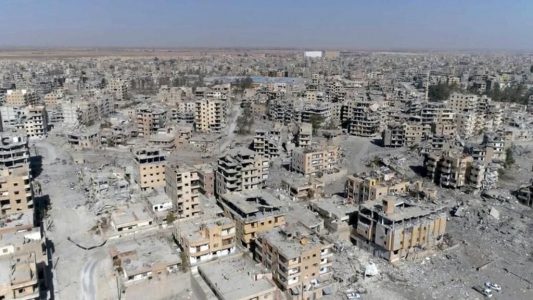
US to fund Syrian detention facilities but will this address Islamic State threats?
With looming challenges in Syria, the US Department of Defense (DoD) is preparing to address them as it faces military challenges and threats to civil security.
The US and its coalition partners said they are proceeding with their mission in Syria to “Defeat ISIS.” However, more than 10,000 ISIS combatants are hosted in “makeshift detention facilities” and approximately 60,000 displaced civilians. The latter is housed in the al-Hol and al-Roj camps. These factors continue to pose a significant threat.
During a conversation held at the Middle East Institute in Washington, District of Columbia, Dana Stroul, the deputy assistant secretary of defense for the Middle East, stated that: “The threat which we all know is that ISIS views the detention facilities where its fighters are housed as the population to reconstitute its army.” Stroul also emphasized in her statement that ISIS views al-Hol and al-Roj facilities, along with the children and teenagers housed in those camps, as the organization’s “future generation.”
According to Stroul, the Islamic State of Iraq and Syria (ISIS) soon crumbled, and as a result, there were insufficient facilities to imprison all of the seized ISIS fighters. These fighters were held in makeshift detention facilities, such as schools or office buildings.
She stated that the detention camps are now overcrowded and unsafe and are being policed by the Syrian Democratic Forces. In addition, they are undergoing tremendous strain from armed military foes, a worsening economy “exacerbated by a historic drought,” and a potential deployment by Turkey in northern Syria.
Meanwhile, Stroul emphasized that while they will be funding better detention facilities, the most long-lasting way of solving problems and threats posed by these detention centers and the camps for displaced people is for the countries of origin to “repatriate, rehabilitate, and reintegrate” their citizens who are currently living in northeast Syria, and where adequate, to “prosecute” those nationals, she said.
In the northeastern part of Syria, approximately 4,000 to 5,000 non-Syrian fighters have been imprisoned. In addition, they have many family members currently staying in overcrowded internally displaced shelters.
These startling numbers indicate a severe and active threat to the region’s safety and the humanitarian efforts of the larger common good, as revealed by Timothy Alan Betts, Acting Coordinator for Counterterrorism and Acting Special Envoy for The Global Coalition to Defeat ISIS.
He also added that these nonfighters run the possibility of these individuals relocating from “conflict to conflict” zones in a way that produces additional trouble and unrest outside, affects national collective security, and poses severe threats to noncombatants if they leave coalition forces and their family members in the northeastern part of Syria.
“We risk these individuals migrating from conflict to conflict in a way that creates new strife and instability elsewhere, threatens our collective security, and presents serious threats to innocent civilians,” he noted.
She stated that the Department of Defense is working on different streams of an attempt to bolster the Syrian Democratic Forces in their endeavor to provide for the decent and safe detention of ISIS members who are now in their hands. She emphasized the building of new detention facilities as the priority.
The new detention camps, which the Department of Defense is financially backing, will also facilitate essential US formation objectives, such as ensuring detainees have access to healthcare and providing youth detainees with highly specialized “programming and facilities” to confront their security and rehabilitation needs.
On July 5, two special flights contracted by the French government, one of which was a medical plane, arrived in Paris with 16 jihadist women and 35 children aboard. Every detained French citizen was sent home after being confined in detention centers northeast of Syria. Since the defeat of the Islamic State organization in Baghouz in March 2019, this is the most extensive repatriation undertaking that the French authorities have carried out.
However, around 160 children and 75 women from France are still being kept against their will in Syria, regardless of their conditions are appalling and present a risk to their lives. In addition, approximately sixty French men are being detained in overcrowded prisons on suspicion of alleged connections to ISIS.
Since 2019, ISIS has been holding lots of expatriates from around 60 different nationalities in northeast Syria as ISIS suspects and relatives. These French nationals are among those imprisoned.
Source: Sofrep





